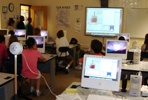As I see and feel the end of the year approaching I have been thinking of the work done by our students and teachers in the past academic year. I am also in the process of looking forward as I begin the process of ordering supplies for the 2008 – 2009 academic year. My own learning has grown this year as I learned more about working with middle school students and teachers, using DAILE Moodle to extend and support learning, iLife and iWork ’08 software to create well designed student projects, and how many of my colleagues support my desire to see our school adopt and expand the tools we use with our students by stepping up to the plate and modeling life long learning.
I have blogged about many of the projects that our students have done as I am proud to play a part in helping them learn forward with technology. For other community and class projects see: MS Digital Learning. I am the person who is the executive producer as I do the iWeb for this content. I hope to change that next year so students and teachers can produce the content directly with our new Leopard Podcast Producer. My hope is that we will make creating content and publishing content both easy but also as a natural process in the normal learning grid of a classroom. Students have always handed in homework on paper and now I hope to have students hand in their digital content so teachers can assess it and then publish it. We do some of this within the DAILE Moodle CMS but the audience is limited to just course members. We all want to publish to a larger audience and our students live in a world of instant publishing and content distribution.
I know how I have reacted to being published as yesterday I spoke with Peter Jauss from Parat Solutions about their iPod cases and synchronization tools for the new iPods for the Lower School. He said I was just reading about you in T.H.E. Journal and it triggered my memory that I had done an interview a few months back (Rearview Mirror) about our use of iPods and Raybook Math Facts. We live in an interconnected world where information flows with fewer boundaries then we adults know. How do schools reflect this flow of information? For too many students it is still one way I am afraid.
My windshield sees 8th grade students working on creating a Constitution project in history. They are making PowerPoints, Keynotes, iMovies and other content after being inspired by a project shown from last year. Allison K. did a remarkable movie that she brought in on a DVD which due to music used, I can not post on the web. However, she has inspired the students behind her to stretch themselves further. Mr. Dahlgren just poked his head in and confirmed this as he thought the partnerships and the work being done reflected ” the students running with this project”. He feels the students that have taken him up on reviewing their information (still the role of any teacher with research projects) have the the facts straight and could produce another round of inspirational and factual projects. Students using camcorders, headsets, learning how to compress files for transport to and from school, exporting files to different formats while developing a deeper understanding of the US Constitution is engaged and relevant learning.
Also in my windshield are 6th grade students creating their 4th booktalk of the year. Using Keynote, Mrs. Williamson is asking her students to stretch themselves by incorporating creativity, multiple programs into telling the story of the book they read. Keynote is the main tool with students using Alpha Channel, A to B animation, along with narrating their booktalk. Photoshop is a natural for some students when they need to have just the perfect image and a Google search does not turn up an image. (I think Photoshop is the better solution as creators have a future). Garageband is used to create a theme song for the book. Andrew H. used his home computer to create a theme song, shared it to iTunes and brought it in on a USB flash drive to use in his Keynote. He worked on his booktalk over the weekend! I know, what is the big deal, but he was working on his booktalk over the weekend and it was not writing a report, it was composing theme music for his booktalk. Did I mention the deal about how creative people will do well in the future. Daniel Pink’s book is a must read and is the foundation for a workshop here this summer and a book discussion group in August of Durham Academy teachers.
Next week I will work with 5th grade students who will podcast their research on 20th Century events. I was in the Library yesterday when word “leaked out” that phase 2 of the project would be recording podcasts. One student said that I would put them on iTunes, and I said, what do you mean? She said, “Our poetry is there already so why not our research projects”? This of course left me the opening of how I would be glad to publish their work as long as it is of publishable quality and that all resources are cited. Are students willing to meet these rigid standards? You bet they are and the more we can do to instill the need to publish quality, well-researched and properly cited work, the less time we will spend looking in our rearview mirror wondering what we just left behind us on the road of learning.
Now, how do we keep those bugs off of our Learning Windshield?
Technorati Tags: class2.0, learning

